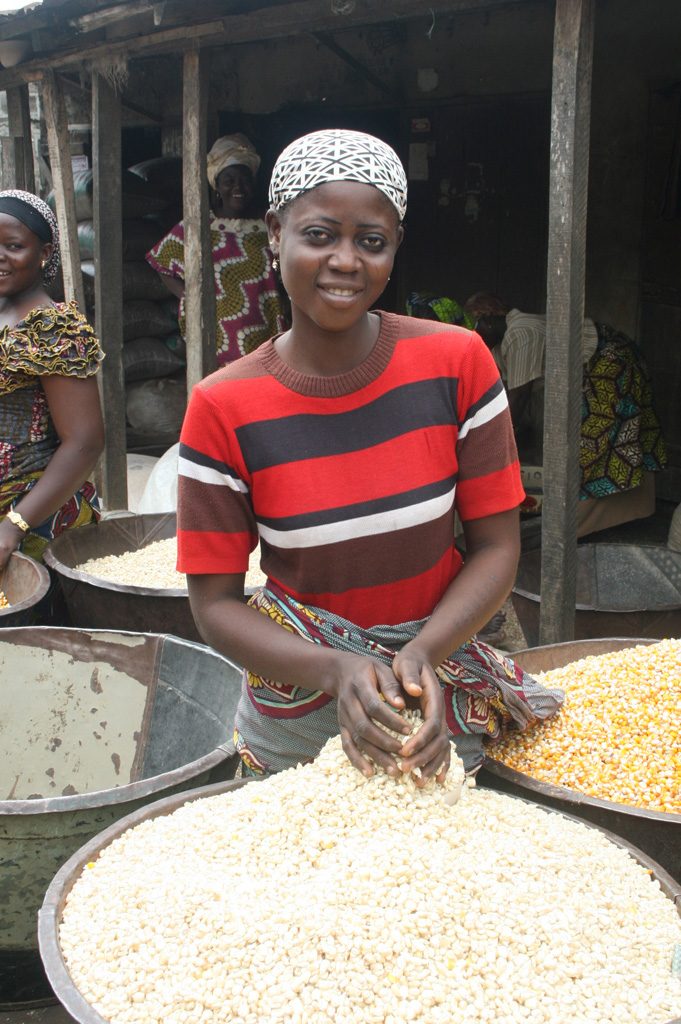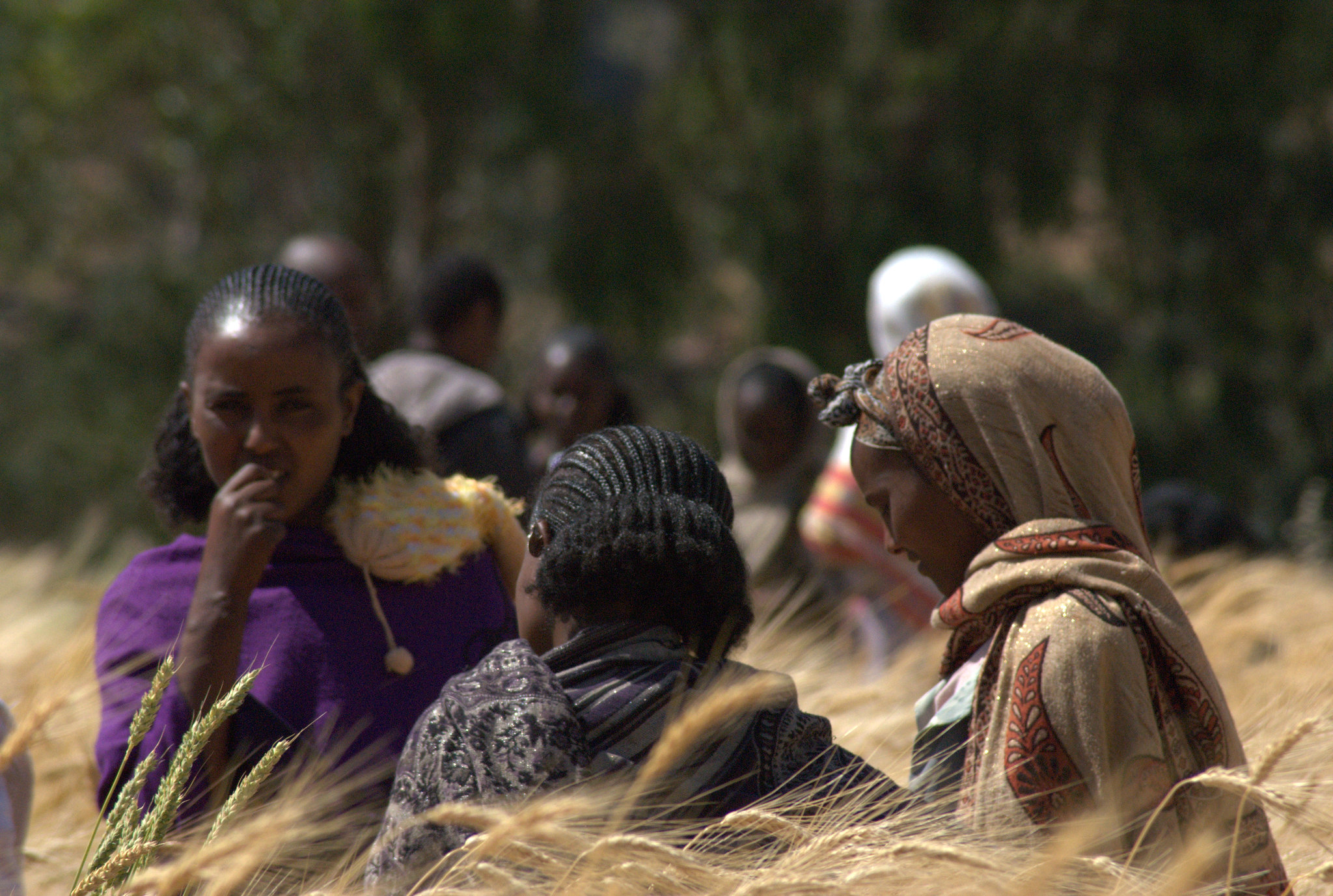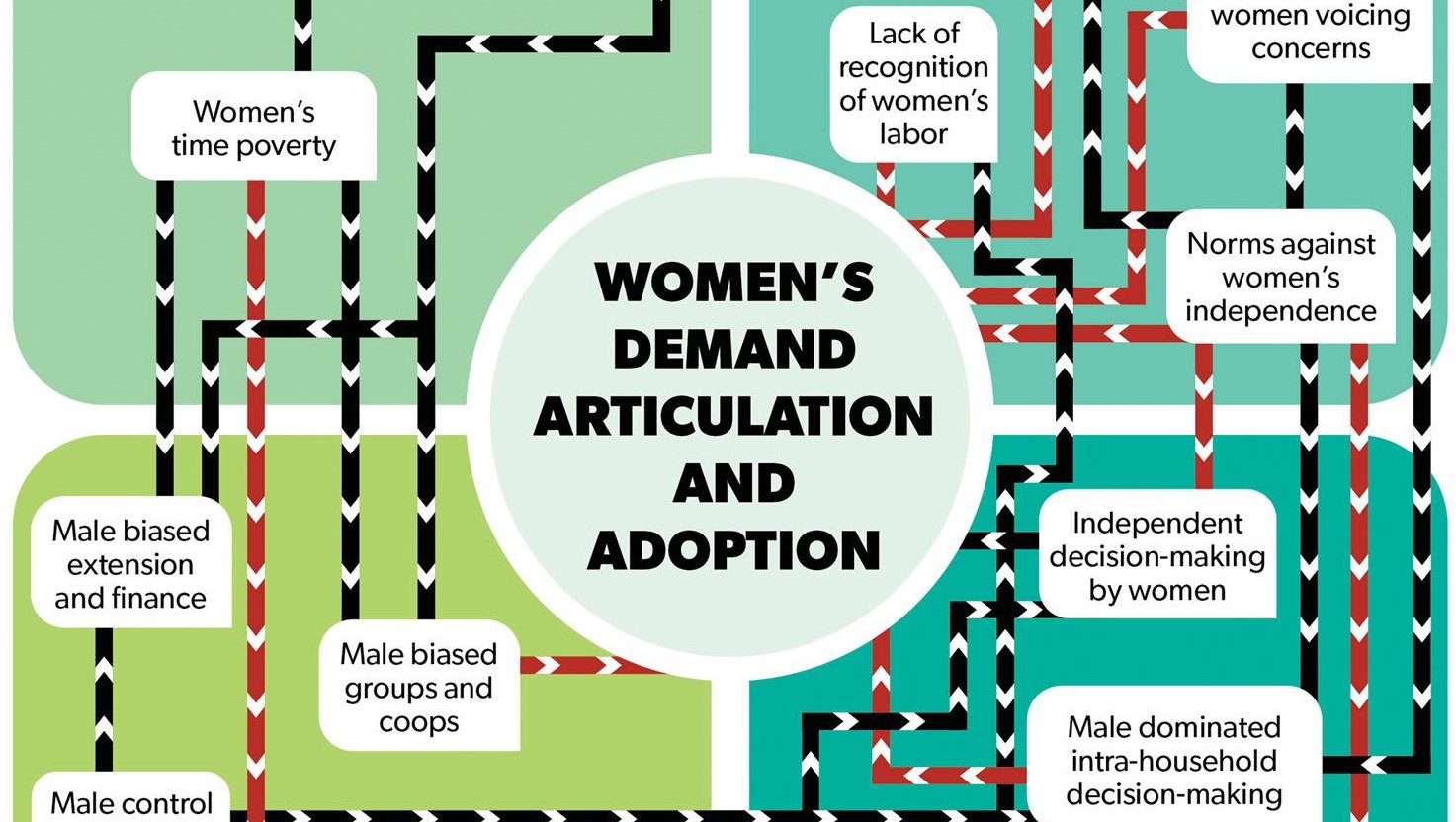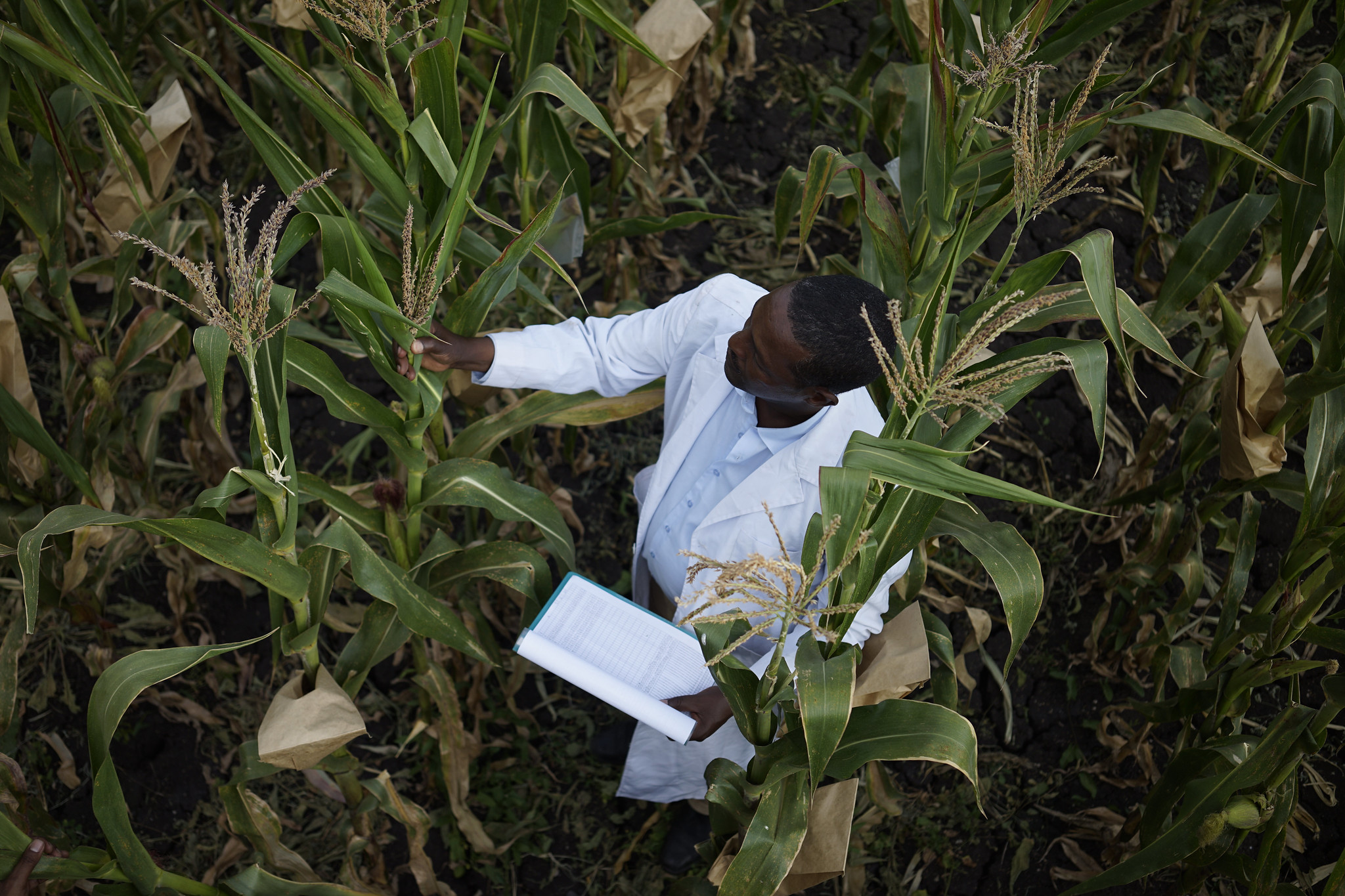For smallholder farmers in sub-Saharan Africa, new agricultural technologies such as improved maize varieties offer numerous benefits — increased incomes, lower workloads and better food security, among others. However, when new technologies are introduced, they can denaturalize and expose gender norms and power relations because their adoption inevitably requires women and men to renegotiate the rules of the game. The adoption of new varieties will often be accompanied by a number of related decisions on the allocation of farm labor, the purchase and use of inorganic fertilizers, switching crops between women- and men-managed plots, and the types of benefit household members expect to secure may change.
In an article published this month in Gender, Technology and Development, researchers from the International Maize and Wheat Improvement Center (CIMMYT) explore how women in Nigeria negotiate these new power dynamics to access and secure the benefits of improved maize varieties and, more broadly, to expand their decision-making space.
Using focus group and interview data collected as part of the GENNOVATE project, the authors draw on case studies from four villages — two in the northern states of Kaduna and Plateau; two in the southwestern state of Oyo — to develop an understanding of the relationship between gender norms, women’s ability and willingness to express their agency, and the uptake of agricultural technologies. “This is an important step toward improving the capacity of agricultural research for development to design and scale innovations,” say the authors. “Achieving this ambition is highly relevant to maize.”
The results were similar across all four sites. The authors found that women in each area were constrained by powerful gender norms which privilege male agency and largely frown upon women’s empowerment, thus limiting their ability to maximize the benefits from improved varieties or realize their agency in other domains.
All women respondents remarked that improved maize varieties were easy to adopt, have higher yields and mature quickly, which meant that income flows started earlier and helped them meet household expenditures on time. They prioritized the contribution of improved maize to securing household food security, which helped them meet their ascribed gender roles as food providers.
“At the same time though, women felt they could not maximize their benefits from improved maize varieties due to men’s dominance in decision-making,” the authors explain. “This was particularly the case for married women.”
“Men are meant to travel far – not women”

Embedded gender norms – particularly those relating to mobility – infuse the wider environment and mean that women’s access to opportunities is considerably more restricted than it is for men.
The findings demonstrate that both women and men farmers secure benefits from improved maize varieties. However, men accrue more benefits and benefit directly, as they have unfettered mobility and opportunity. They can access markets that are further away, and the maize they sell is unprocessed and requires no transformation. Additionally, men do not question their right to devote profits from maize primarily to their own concerns, nor their right to secure a high level of control over the money women make.
On the other hand, women respondents — regardless of age and income cohort — repeatedly stated that while it is hard to earn significant money from local sales of the processed maize products they make, it is also very difficult for them to enter large markets selling unprocessed, improved maize.
The difficulties women face in trying to grow maize businesses may be partly related to a lack of business acumen and experience, but a primary reason is limited personal mobility in all four communities. For example, in Sabon Birni village, Kaduna, women lamented that though the local market is not large enough to accommodate their maize processing and other agri-business ventures, they are not permitted travel to markets further afield where ‘there are always people ready to buy’.
“Women’s benefits relate to the fact that improved maize varieties increase the absolute size of the ‘maize cake’,” say the authors. “They expect to get a larger slice as a consequence. However, the absolute potential of improved varieties for boosting women’s incomes and other options of importance to women is hampered by gender norms that significantly restrict their agency.”
The implications for maize research and development are that an improved understanding of the complex relational nature of empowerment is essential when introducing new agricultural technologies.
Read the full paper:
Unequal partners: associations between power, agency and benefits among women and men maize farmers in Nigeria
Other recent publications from GENNOVATE:
Continuity and Change: Performing Gender in Rural Tanzania
Engaging men in gender-equitable practices in maize systems of sub-Saharan Africa
Cover photo: Maize and other food crops on sale at Ijaye market, Oyo State, Nigeria. (Photo: Adebayo O./IITA)
Read more recent publications by CIMMYT researchers:
- Phenotypic characterization of Canadian barley advanced breeding lines for multiple disease resistance. 2019. Osman, M., Xinyao He, Capettini, F., Helm, J., Singh, P.K. In: Cereal Research Communications v. 47, no. 3, pg. 484-495.
- Tillage and crop rotations enhance populations of earthworms, termites, dung beetles and centipedes: evidence from a long-term trial in Zambia. 2019. Muoni, T., Mhlanga, B., Forkman, J., Sitali, M., Thierfelder, C. In: Journal of Agricultural Science v. 157, no. 6, pg. 504-514.
- Genética de la resistencia a roya amarilla causada por Puccinia striiiformis f. sp. tritici W. en tres genotipos de trigo (Triticum aestivum L.) = Genetics of the resistance to yellow rust caused by Puccinia striiformis f. sp. tritici W. in three genotypes of wheat (Tritcum aestivum L.). 2019. Rodriguez-Garcia, M.F., Rojas Martínez, R.I., Huerta-Espino, J., Villaseñor Mir, H.E., Zavaleta Mejía, E., Sandoval-Islas, S., Crossa, J. In: Revista Fitotecnia Mexicana v. 42, no. 1, pg. 31-38.
- Mapping of maize storage losses due to insect pests in central Mexico. 2019. García-Lara, S., García-Jaimes, E., Bergvinson, D.J. In: Journal of Stored Products Research v. 84, art. 101529.
- Analysis of distribution systems for supply of synthetic grain protectants to maize smallholder farmers in Zimbabwe: implications for hermetic grain storage bag distribution. 2019. Govereh, J., Muchetu, R.G., Mvumi, B.M., Chuma, T. In: Journal of Stored Products Research v. 84, art. 101520.
- Agronomic performance and susceptibility of seven Ghanaian improved sweet potato varieties to the sweet potato weevil, Cylas spp. (Coleoptera: Brentidae) in Coastal Savanna zone of Ghana. 2019. Adom, M., Fening, K.O., Wilson, D.D., Adofo, K., Bruce, A.Y. In: African Entomology v. 27, no. 2, pg. 312-321.
- Validation of candidate gene-based markers and identification of novel loci for thousand-grain weight in spring bread wheat. 2019. Sehgal, D., Mondal, S., Guzman, C., Garcia Barrios, G., Franco, C., Singh, R.P., Dreisigacker, S. In: Frontiers in Plant Science v. 19, art. 1189.
- Genomic prediction and genome-wide association studies of flour yield and alveograph quality traits using advanced winter wheat breeding material. 2019. Kristensen, P.S., Jensen, J., Andersen, J.P., Guzman, C., Orabi, J., Jahoor, A. In: Genes v. 10, no. 9, art. 669.
- Identification of superior doubled haploid maize (Zea mays) inbred lines derived from high oil content subtropical populations. 2019. Silva-Venancio, S., Preciado-Ortiz, R.E., Covarrubias-Prieto, J., Ortíz-Islas, S., Serna-Saldivar, S.O., García-Lara, S., Terron Ibarra, A., Palacios-Rojas, N. In: Maydica v. 64, no. 1, pg. 1-11.
- Tillage and residue-management effects on productivity, profitability and soil properties in a rice-maize-mungbean system in the Eastern Gangetic Plains. 2019. Rashid, M.H., Timsina, J., Islam, N., Saiful Islam. In: Journal of Crop Improvement v. 33, no. 5, pg. 683-710.
- Mapping of genetic loci conferring resistance to leaf rust from three globally resistant durum wheat sources. 2019. Kthiri, D., Loladze, A., N’Diaye, A., Nilsen, K., Walkowiak, S., Dreisigacker, S., Ammar, K., Pozniak, C.J. In: Frontiers in Plant Science v. 10, art. 1247.
- Compost amended with N enhances maize productivity and soil properties in semi-arid agriculture. 2019. Shahid Iqbal, Arif, M., Khan, H.Z., Yasmeen, T., Thierfelder, C., Tang Li, Khan, S., Nadir, S., Jianchu Xu In: Agronomy Journal v. 111 no. 5, pg. 2536-2544.
- Simulation-based maize–wheat cropping system optimization in the midhills of Nepal. 2019. Laborde, J.P., Wortmann, C.S., Blanco-Canqui, H., McDonald, A., Lindquist, J.L. In: Agronomy Journal v. 111, no. 5, pg. 2569-2581.
- Affordability linked with subsidy: impact of fertilizers subsidy on household welfare in Pakistan. 2019. Ali, A., Rahut, D.B., Imtiaz, M. In: Sustainability v. 11, no. 19, art. 5161.
- Field-specific nutrient management using Rice Crop Manager decision support tool in Odisha, India. 2019. Sharma, S., Rout, K.K., Khanda, C.M., Tripathi, R., Shahid, M., Nayak, A.D., Satpathy, S.D., Banik, N.C., Iftikar, W., Parida, N., Kumar, V., Mishra, A., Castillo, R.L., Velasco, T., Buresh, R.J. In: Field Crops Research v. 241, art. 107578.
- Balanced nutrient requirements for maize in the Northern Nigerian Savanna: parameterization and validation of QUEFTS model. 2019. Shehu, B.M., Lawan, B.A., Jibrin, J. M., Kamara, A. Y., Mohammed, I.B., Rurinda, J., Shamie Zingore, Craufurd, P., Vanlauwe, B., Adam, A.M., Merckx, R. In: Field Crops Research v. 241, art. 107585.
- Factor analysis to investigate genotype and genotype × environment interaction effects on pro- vitamin A content and yield in maize synthetics. 2019. Mengesha, W., Menkir, A., Meseka, S., Bossey, B., Afolabi, A., Burgueño, J., Crossa, J. In: Euphytica v. 215, no. 11, art. 180.
- Agricultural productivity and soil carbon dynamics: a bioeconomic model. 2019. Berazneva, J., Conrad, J.M., Güereña, D. T., Lehmann, J., Woolf, D. In: American Journal of Agricultural Economics v. 101, no.4, pg. 1021-1046.
- Effect of manures and fertilizers on soil physical properties, build-up of macro and micronutrients and uptake in soil under different cropping systems: a review. 2019. Dhaliwal, S.S., Naresh, R.K., Mandal, A., Walia, M.K., Gupta, R.K., Singh, R., Dhaliwal, M.K. In: Journal of Plant Nutrition v. 42, no. 2, pg. 2873-2900.
- Combined study on genetic diversity of wheat genotypes using SNP marker and phenotypic reaction to Heterodera filipjevi. 2019. Majd Taheri, Z., Tanha Maafi, Z., Nazari, K., Zaynali Nezhad, K., Rakhshandehroo, F., Dababat, A.A. In: Genetic Resources and Crop Evolution v. 66, no. 8, pg. 1791-1811.
- Characterization of QTLs for seedling resistance to tan spot and septoria nodorum blotch in the PBW343/Kenya Nyangumi wheat recombinant inbred lines population. 2019. Singh, P.K., Sukhwinder-Singh, Zhiying Deng, Xinyao He, Kehel, Z., Singh, R.P. In: International Journal of Molecular Sciences v. 20, no. 21, art. 5432.
- Rapid identification and characterization of genetic loci for defective kernel in bread wheat. 2019. Chao Fu, Jiuyuan Du, Xiuling Tian, He Zhonghu, Luping Fu, Yue Wang, Dengan Xu, Xiaoting Xu, Xianchun Xia, Zhang Yan, Shuanghe Cao In: BMC Plant Biology v. 19, no. 1, art. 483.
- Nitrogen fertilizer rate increases plant uptake and soil availability of essential nutrients in continuous maize production in Kenya and Zimbabwe. 2019. Pasley, H.R., Cairns, J.E., Camberato, J.J., Vyn, T.J. In: Nutrient Cycling in Agroecosystems v. 115, no. 3, pg. 373-389.
- Identification of a conserved ph1b-mediated 5DS–5BS crossing over site in soft-kernel durum wheat (Triticum turgidum subsp. durum) lines. 2019. Ibba, M.I., Mingyi Zhang, Xiwen Cai, Morris, C.F. In: Euphytica v. 215, art. 200.
- Optimum and decorrelated constrained multistage linear phenotypic selection indices theory. 2019. Ceron Rojas, J.J., Toledo, F.H., Crossa, J. In: Crop Science v. 59, no. 6, pg. 2585-2600.
- Comparison of weighted and unweighted stage-wise analysis for genome-wide association studies and genomic selection. 2019. Tigist Mideksa Damesa, Hartung, J., Gowda, M., Beyene, Y., Das, B., Fentaye Kassa Semagn, Piepho, H.P. In: Crop Science v. 59, no. 6, pg. 2572-2584.
- Effects of drought and low nitrogen stress on provitamin a carotenoid content of biofortified maize hybrids. 2019. Ortiz-Covarrubias, Y., Dhliwayo, T., Palacios-Rojas, N., Thokozile Ndhlela, Magorokosho, C., Aguilar Rincón, V.H., Cruz-Morales, A.S., Trachsel, S. In: Crop Science v. 59, no. 6, pg. 2521-2532.
- Designing interventions in local value chains for improved health and nutrition: insights from Malawi. 2019. Donovan, J.A., Gelli, A. In: World Development Perspectives v. 16, art. 100149.

 Climate adaptation and mitigation
Climate adaptation and mitigation 


